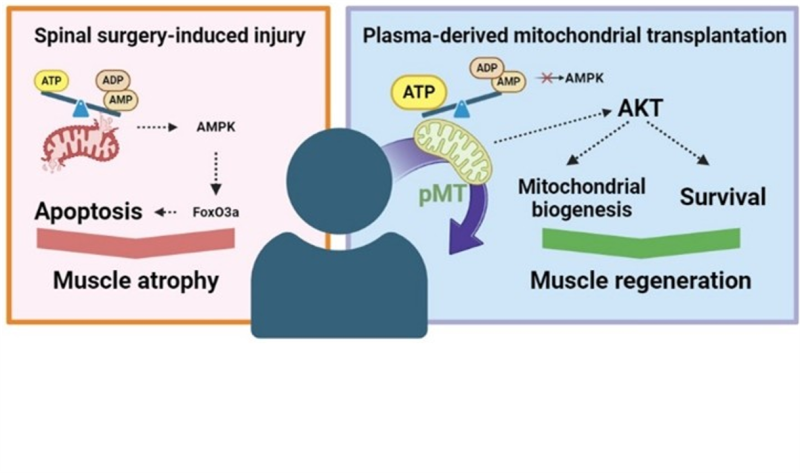2025년 08월 Plasma-derived Mitochondrial Transplantation Attenuates Paraspinal Muscle Atrophy Following Spinal Surgery
첨부파일
-
 2025-08 Plasma-derived Mitochondrial Transplantation Attenuates Paraspinal Muscle Atrophy Following Spinal Surgery.pdf
(2.4M)
9회 다운로드
DATE : 2025-09-24 13:44:16
2025-08 Plasma-derived Mitochondrial Transplantation Attenuates Paraspinal Muscle Atrophy Following Spinal Surgery.pdf
(2.4M)
9회 다운로드
DATE : 2025-09-24 13:44:16
관련링크
본문
Paraspinal muscle atrophy (PMA) is a common complication after spinal surgery, often leading to reduced spinal stability and prolonged discomfort. While mitochondrial dysfunction has emerged as a key contributor to PMA, existing therapies do not adequately address this underlying pathophysiology. In this study, we investigated the regenerative potential of plasma-derived mitochondria (pMT) as a cell-free and autologous biomaterial to mitigate PMA. Mitochondria were isolated from human peripheral blood and confirmed to maintain their structural integrity and respiratory activity. In an in vitro model of muscle atrophy, pMT treatment improved cell viability, enhanced ATP production, and restored mitochondrial function. In a rat model of surgery-induced PMA, intramuscular injections of pMT led to improved muscle morphology, including increased fiber cross-sectional area, along with reduced mechanical hypersensitivity. Transcriptomic analyses revealed that pMT transplantation modulated key pathways related to mitochondrial biogenesis and oxidative phosphorylation, while downregulating pro-apoptotic signals. These findings were corroborated by protein-level assessments showing restoration of muscle-specific markers and normalization of mitochondrial homeostasis. Taken together, this study highlights the therapeutic potential of pMT transplantation in addressing mitochondrial dysfunction and promoting muscle regeneration following spinal surgery. These findings suggest that pMT may serve as a minimally invasive, scalable, and autologous regenerative approach to restore skeletal muscle integrity in clinically relevant contexts.









